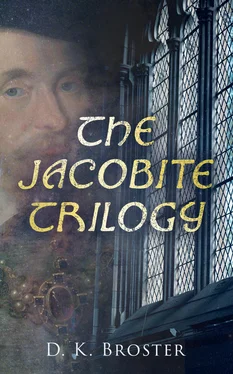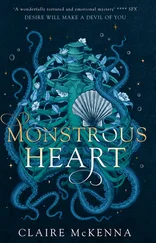Keith had put his hand over his eyes. “Yes; go on,” he said after a moment.
“This was plainly rather a blow to Mr. Cameron,” continued Paton. “I saw the blood rush to his face. ‘What did you say?’ he asked. The Major replied that you, sir, being a loyal subject of King George, were just as eager to secure Lochiel as himself, which was the reason why you had very properly stopped him from having the prisoner shot. To that Mr. Cameron replied, short and sharp, ‘I don’t believe it!’ The Major affected to misunderstand this, and . . . well, sir, he said a good many things incriminating you in the affair, twisting what you had, perhaps, said . . .”
“Try, for God’s sake, to remember what those things were,” begged Keith miserably, without looking up.
The young man paused a moment, evidently trying to remember accurately.
“First, I think, he told Mr. Cameron that you had said he was Cameron of Ardroy, Lochiel’s cousin, and had had you as his prisoner after the affair at High Bridge, and he added, ‘I doubt he wanted to get even with you for that!’ And to make his assertion more credible he asked Mr. Cameron how otherwise he should have known who he was, since he took him for a gillie when he had him up against the shieling wall. And the Major went on to say that for the news of Mr. Cameron’s identity he was grateful to you, but not so grateful when he found that you had stolen a march on him by sneaking back to the shieling by night in order to get information out of the prisoner before he could. But at that Mr. Cameron tried to raise himself on the litter, and burst out, ‘That’s a lie!’ And then the Major silenced him by what I can only suppose was an arrow drawn at a venture, since you . . . I don’t suppose that you . . .” Paton began to stumble.
“Let me have it!” said Keith, looking up this time.
“He said, ‘And so he never speired about Lochiel . . . where he was . . . if you kenned where he was?’ ”
Keith stared at the narrator half dazed. “How did he know that . . . he could not have known it!”
“As I say, it seemed to silence Mr. Cameron altogether,” continued Paton, glancing at him with a sort of pity. “He looked quite dizzy as he dropped back on the litter. But the Major laughed. And he went on, in that bantering way he has: ‘I hope you did not tell him, for I want you to tell me. Did you tell him?’ The rebel took no notice of this question; he had shut his eyes. It was as I looked at him then, sir, and saw the effect which that question had had on him, that I first began, I confess, to have doubts of your good faith.”
“You had cause,” answered Keith with a groan. “I did ask him about Lochiel—in all innocence. My God, what he must think of me!” He took his head between his hands. “Go on!”
“Finding that Mr. Cameron was silent,” resumed Paton, “Major Guthrie went nearer and said something, I do not exactly remember what, about dropping a hint inadvertently with regard to Lochiel’s hiding-place, which it was easy to do, he said, and which he should give the prisoner every opportunity of doing, keeping him there, indeed, until he did. He kept harping for awhile on this question of dropping a hint, and he brought you even into that, for he said that it was your suggestion, that you had advised him to bring the rebel into camp and watch him well for that purpose. . . . And from what you have just told me, sir, it seems that that was true.”
Paton paused; but Keith, his head between his hands, said nothing; he was beyond it. This was what came of doing evil in order to accomplish good!
“Still Mr. Cameron took no notice,” pursued Paton, “even when the Major went on to say in so many words that you had betrayed him—Mr. Cameron—and had then ridden off, leaving him the dirty work to do. Then he changed his tone, and said, ‘But I shall not flinch from it; ’tis my duty. Do you know, Mr. Cameron of Ardroy, how we deal with folk that have valuable information and will not part with it?’ At that the prisoner did open his eyes, and said with a good deal of contempt that, from what he had seen of the Major, he could very well guess.
“The Major at that bent over him and gripped him by the nearer arm. He may not have observed that it was bandaged—I cannot say—and repeated, ‘Ah, you can quite imagine, can you? D’you think you’ll like it?’ Mr. Cameron did not answer; perhaps he could not, for he was biting his lip, and I saw the sweat come out on his brow. Major Guthrie let go and stood up again, and said that a flogging with belts would soon loosen his tongue; and that did rouse Mr. Cameron, for he coloured hotly and said he thought the Major forgot that he was a gentleman. But the Major replied with a chuckle that he looked so little like one at present that it was easy to assume that he was not. Then he asked him whether he intended to save himself from this unpleasant experience, as he easily could do; Mr. Cameron’s look was sufficient answer to that. So, to my horror, the Major sent for the drummers and ordered a tent to be struck, in order to have the pole available to tie him up to.”
“This is intolerable!” exclaimed Keith, starting up. “Stop! I had rather not——” He pulled himself together. “No, I have got to hear it. Go on!”
“I assure you that I did not enjoy it,” said the young officer, “for I thought that the matter was going through. They lifted Mr. Cameron off the litter; he could not stand, it appeared, owing to the wound in his thigh, and the men were obliged to support him. But the Major said to him that he would not be able to fall this time, as he had done yesterday, because we had ropes here. . . . I myself, who would willingly have interfered before, sir, had there been any chance of being listened to, now took the Major by the arm and told him plainly that he would kill the prisoner if he was so barbarous as to have him flogged in his present condition. But he shook me off, and said, when everything was ready (except Mr. Cameron himself, who was still held up there, facing him, as white as you please, but perfectly unyielding and defiant): ‘Now, before you make acquaintance with His Majesty’s leather, will you tell me what you know about Lochiel?’ And the rebel, with his eyes blazing, said, in a sudden access of fury, ‘Not if you cut me to pieces!’
“Well, sir, though I am convinced that the Major was not acting a part and merely threatening, but that he really meant to go through with the horrid business, I think it must have come to him then that, if he did, he would have Mr. Cameron dead on his hands, as I had warned him, and there would be an end to that source of information. (It is possible, too, that he thought he might be called to account for it afterwards.) And even the men were looking uneasy and murmuring a little. So he said that he would postpone the flogging until the afternoon. He had the prisoner carried into his own tent, not much, I fear, the better for this scene; and in his tent Mr. Cameron was all the rest of the day and the night. I do not know what passed in there, for whenever I made an effort to go in, I was stopped; but I am sure the Major questioned him pretty continuously. He still spoke of the flogging taking place, but it never did. Next morning I was not surprised to hear that the prisoner seemed worse, and in a fever, so that the Major resolved to be rid of him, and sent him to Fort Augustus. I was heartily glad, for his own sake, to see Mr. Cameron taken away. And at Fort Augustus he must have had care, or he would not be alive now, which he is, for I asked news of him yesterday, as we came by. But that I should be ashamed to meet him, I would fain have seen him to ask his pardon.”
Paton’s voice ceased; in the silence one of the horses near them stamped and blew out its nostrils. Keith, standing there very still, released his own tightly gripped elbows.
Читать дальше












